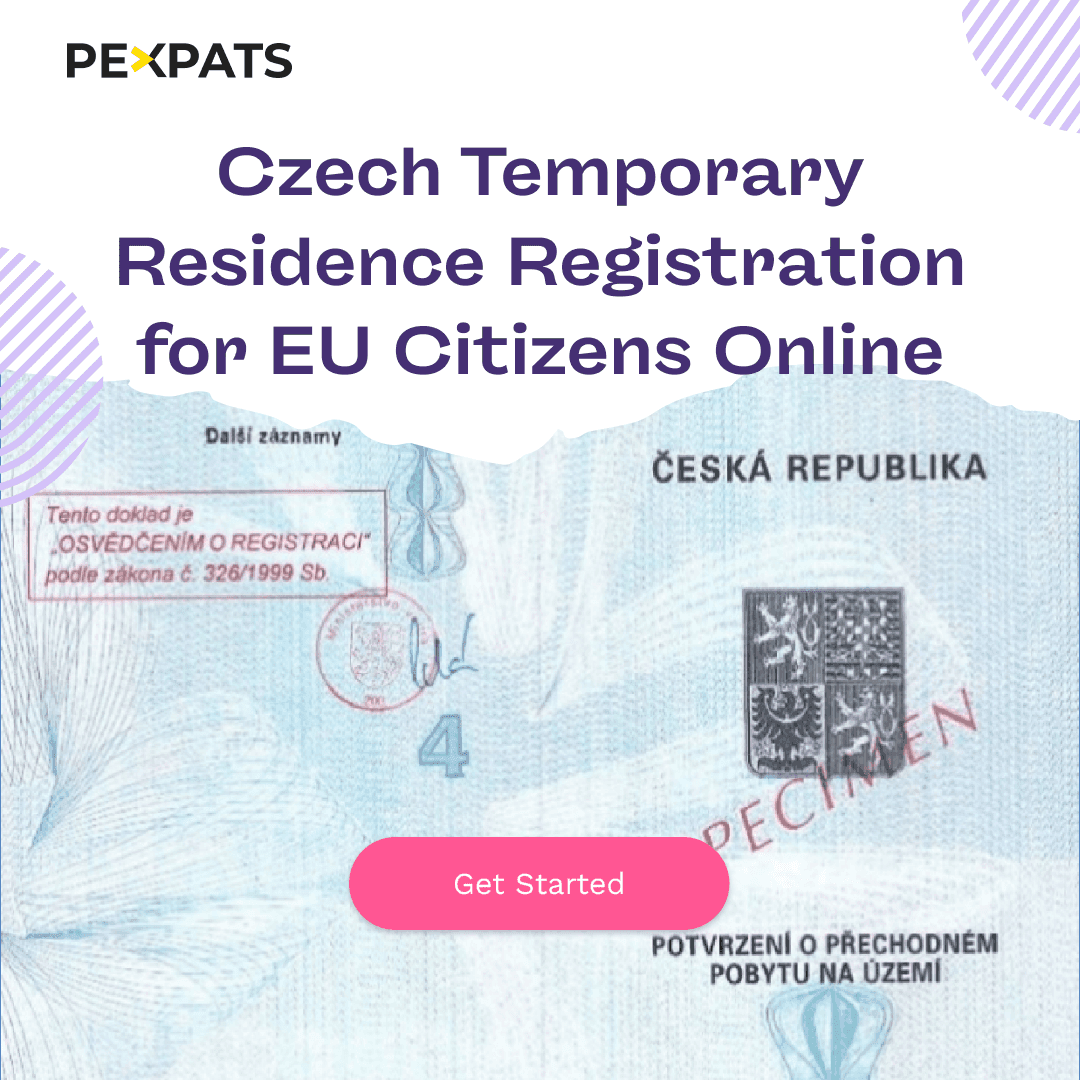The Czech temporary residency registration certificate provides legal residency status for EU citizens in the Czech Republic. This temporary residency certificate is issued for up to 10 years and can be upgraded to permanent residency in the Czech Republic after 5 years.
10 Reasons for EU Citizens to Get Czech Temporary Residency
Temporary Residency for EU Citizens in the Czech Republic is also known as the Czech Residency Certificate, or, officially, the Registration Certificate for EU Citizens.
While EU citizens aren’t obligated by law to obtain residency or possess a visa, temporary residency does have its advantages. For one, temporary residency permits for EU citizens are issued for 10 years. Then, it’s also possible to exchange temporary residency for permanent residency after 5 years in the Czech Republic.
Czech temporary residency provides permit holders with mostly the same rights as Czech citizens. There are some exceptions, such as not possessing the right to vote or serve in the Czech military. Nonetheless, provisions include access to Czech banks, tax identification, parental allowance, sponsorship of non-EU partners and more.
Often, expats from within the EU might confuse temporary residency with their registration at the Foreign Police. These are two entirely different things, however. For anybody residing in the Czech Republic longer than 3 days, registering with the Czech Foreign Police is mandatory. It does not grant any rights, nor does it count as proof of residency, unlike temporary residency.
Pexpats recommends applying for a Czech birth number (rodné číslo) when applying for a Czech temporary registration certificate. The Immigration Office will generate your birth number along with your residency permit approval. The birth number is one of the most important administrative details in the Czech Republic, for example, when doing your employee income tax; it is mandatory.
Let’s dispel any confusion now, shall we? Read on for more. This post covers why & how to get Czech temporary residency for EU citizens, starting first with the advantages.
1 - Vehicle registration and parking
For vehicle registration in the Czech Republic, it is mandatory that the car owner holds a residency permit. The same is true to get Czech auto insurance, which is often more affordable than foreign providers.
Temporary residency also provides permit holders access to parking permits in the Czech Republic. In fact, it is the only proof authorities will accept, just like for vehicle registration and Czech insurance providers. The residency permit allows holders to prove both their eligibility for insurance and their district of residency for parking.
2 - Proof of residency for fiscal parental allowance
Secondly, if an EU citizen wants to get a fiscal parental allowance in the Czech Republic, Czech residency is necessary. This is so Social Security and the Labour Office can ensure the parents are not claiming benefits in multiple countries.
In order to get Czech parental allowance, the parents must prove they live only in the Czech Republic. A temporary residence permit is one of the ways to prove this to authorities, and thus obtain parental benefits.
3 - Bank accounts, mortgage rates, and leasing rates
With a Residency / Registration Certificate, EU citizens also get easier access to Czech banking. For example, the Czech National Bank has many restrictions for opening accounts due to KYC compliance and anti-money laundering laws. These restrictions make it so that most Czech banks now ask even EU citizens for proof of at least temporary residency.
Another advantage to temporary residency is that with access to Czech banks, most offer lower interest rates for mortgages and leasing. This is because banks consider residency permit holders as lower risks than someone who only holds an EU passport.
4 - Czech Tax ID, Social Security, and Czech Birth Numbers
The Registration Certificate for EU citizens also grants the permit holder access to a Czech Identification Number (Rodné číslo). In effect, this number is like a Czech Birth Number. When generated, authorities can then update tax and social security evidence with this ID number.
5 - Apply for a Non-EU Visa directly in Prague
EU citizens also get temporary residency to make it easier to apply for a visa to a non-EU country. This is because many embassies in the Czech Republic now ask for proof of Czech residency when applying for a visa. As a resident, there’s assurance that everything can be accomplished directly in Prague. There is no worry about having to travel outside of the country
6 - Easily arrange a Certificate of Tax Residency
Now, let’s talk about taxation. A number of countries have double taxation. However, many also have a bilateral agreement with the Czech Republic. This agreement allows foreign workers to avoid paying taxes in both the Czech Republic and their home country.
Although foreign countries with this agreement may ask for proof, Financial Tax Offices can issue an official Tax Residency Certificate. This certificate proves tax status over the duration the person has been living and working in the Czech Republic.
It is also easier to get this Tax Residency when the person applying holds a residency permit covering that period of time. This makes it easier for offices to confirm the status of the applicant, and to issue the Tax Residency Certificate.
7 - Upgrade from Temporary to Permanent Residency after 5 years
The next considerable advantage to temporary residency is it paves the way for permanent residency after 5 years. As an EU citizen, it’s possible to obtain permanent residency after 5 continuous years of stay in the country. Permit holders get similar rights as Czech citizens, although without voting rights or the ability to serve in the Czech military.
A Czech temporary residency permit over the 5 years of stay makes it simple to prove the time spent in the country. Because of this, offices look more favorably on permit holders, and the application process in general is much smoother.
8 - Sponsor a non-EU spouse for a “Partnership Visa”
The Residence Permit for Family Members of EU Citizens extends to spouses and partners also residing in the Czech Republic. More oftenly called by its misnomer, the “Czech Partnership Visa”, this permit grants spouses of EU citizens rights in the country.
To sponsor a non-EU spouse or partner for this residence permit, the EU applicant must have a document of Czech residency. This is a requirement of Czech Immigration authorities, and is necessary to arrange the “partnership Visa”. Temporary or permanent residency is enough to officially prove the applicant’s status.
Also, Temporary residency is one of the conditions for arranging an invitation letter for a NON-EU citizen and sponsoring any type of tourist visa with the foreign police.
9 - Marriage arrangement and registering a child’s birth
Finally, for marriage arrangement or registering a child born in the Czech Republic, a residency permit makes it easier. With residency, either temporary or permanent, the permit holder is in the Czech Population Database. Authorities can easily confirm applicants’ status, and issue the relevant official documents.
10 - Mandatory Czech Republic EU Citizen Registration: Temporary Residency Certificate from 2026
Starting on January 1, 2026, registration for EU citizens living in the Czech Republic will be mandatory. All EU citizens staying in the Czech Republic for more than 90 days must obtain a Czech temporary registration certificate. This certificate confirms temporary residency for EU citizens in the Czech Republic and is required for those who plan to stay long-term.
Currently, about 200,000 EU citizens have not yet registered or obtained a temporary residency registration certificate in the Czech Republic. Once registration becomes mandatory, the number of applicants is expected to rise. Processing can take up to 30 days in 2024/2025, so it’s a good idea to arrange your Czech temporary residency registration certificate before many people apply.
What responsibilities come with a Czech temporary residency?
Along with residency, permit holders are responsible for reporting to the MOI any changes to their residency status. Changes in status include things like registering a new address after moving, which must be done within 30 days. If it’s reporting things such as renewed passports or changes in marital status, MOI should be notified within 15 days.
What is required to obtain Czech Temporary Residency of EU citizen?
The Czech Temporary Residence Registration Certificate is applied at the MOI office. Required documents for obtaining Temporary Residence Registration Certificate:
1. Passport or your national ID.
2. Rent Contract or Proof of accommodation form.
3. 2 ID-size photos. Size 3.5 cm x 4.5 cm.
4. Health Insurance. It can be a local public insurance card or your EHIC card*.
5. Purpose of stay document. It can be a work contract, your trade license, or an affidavit the purpose of stay is other.
6. MOI office registration certificate fee of 200 CZK. Can be paid by payment card.
7. Application form for Czech Temporary Residence Registration.
8. Birth number (rodné číslo) application form.
9. Power of attorney representing you fully during the process(Pexpats clients only).
* Note: If you have a job contract or Trade License, you don't need to provide health insurance.
Steps for Temporary Residency Registration of EU Citizens.
Get Required Documents: Arrange all necessary documents from the list above. Make sure your application documents are complete to avoid rejection.
Visit the MOI Office: Expect a wait time of approximately 3 hours without an appointment. The best time to visit is early in the morning. After 8 AM, the MOI office becomes very crowded after 8 AM.
Stay in Contact with MOI: The MOI may send you a proposal letter if any documents are missing or ask providing more documents. If you miss the proposal letter and don’t provide the required documents before the deadline, your application will be rejected.
Collect Temporary Residency: Visit the MOI office to collect your residency registration certificate.
Follow-up for Birth Number: Obtaining your birth number (rodné číslo) usually takes longer than the residency approval process. That is why regularly follow-up MOI.
Collect Birth Number: Return to the MOI office to collect your birth number. The MOI employee will issue a new residency certificate with your birth number and a birth number certificate.
Pexpats Is the Only Provider Offering This Entirely Online
Most providers in the Czech Republic require in-person appointments or that you speak Czech. Pexpats is the only service that handles the full temporary residency process online — from the first form to the certificate collection.
No office visits on your own
No Czech language required
We represent you under a power of attorney
Your Contact Agent communicates with the Ministry for you
You only attend the certificate collection, and we go with you
This is not just guidance — it’s a real legal service, delivered remotely.

